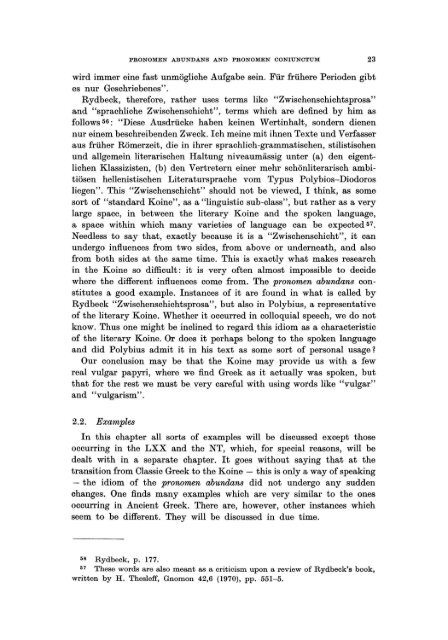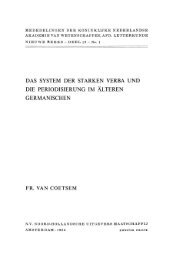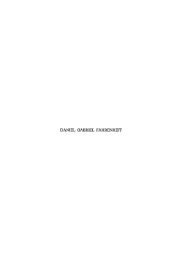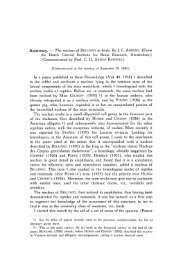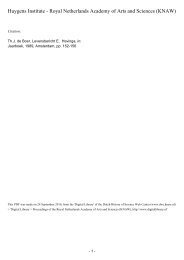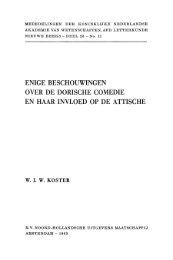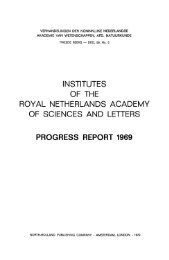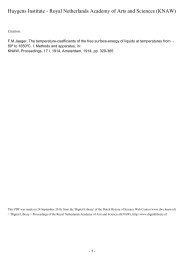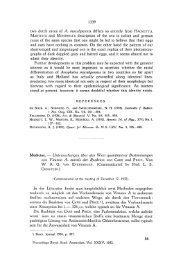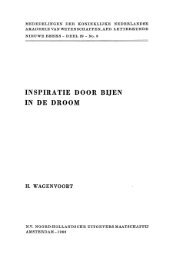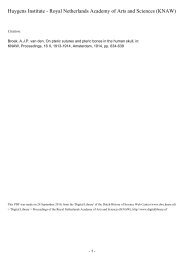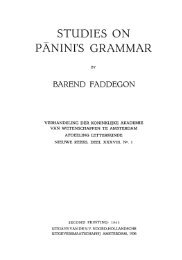Pronomen Abundans and Pronomen Coniunctum. A ... - DWC
Pronomen Abundans and Pronomen Coniunctum. A ... - DWC
Pronomen Abundans and Pronomen Coniunctum. A ... - DWC
Create successful ePaper yourself
Turn your PDF publications into a flip-book with our unique Google optimized e-Paper software.
PRONOMEN ABUNDANS AND PRONOMEN CONIUNCTUM 23<br />
wird immer eine fast unmögliche Aufgabe sein. Für frühere Perioden gibt<br />
es nul' Geschriebenes".<br />
Rydbeek, therefore, rather uses terms like "Zwisehensehiehtsprosa"<br />
<strong>and</strong> "sprachliche Zwischenschicht", terms which are defined by him as<br />
follows 56: "Diese Ausdrüeke haben keinen Wertinhalt, sondern dienen<br />
nur einem besehreibenden Zweek. Ieh meine mit ihnen Texte und Verfasser<br />
aus früher Römerzeit, die in ihrer sprachlieh-grammatischen, stilistisehen<br />
und allgemein literarisehen Haltung niveaumässig unter (a) den eigentliehen<br />
Klassizisten, (b) den Vertretern einer mehr sehönliterariseh ambitiösen<br />
hellenistisehen Literatursprache vom Typus Polybios-Diodoros<br />
liegen". This "Zwischensehicht" should not be viewed, I think, as some<br />
sort of "st<strong>and</strong>ard Koine", as a "linguistic sub-class", but rather as a very<br />
large spaee, in between the literary Koine <strong>and</strong> the spoken language,<br />
a space within which many varieties of language can be expected 57.<br />
Needless to say that, exactly because it is a "Zwisehenschicht", it can<br />
undergo influences from two sides, from above or underneath, <strong>and</strong> also<br />
from both sides at the same time. This is exactly what makes research<br />
in the Koine so difficult: it is very of ten almost impossible to decide<br />
where the different influenees come from. The pronomen abundans constitutes<br />
a good example. Instances of it are found in what is called by<br />
Rydbeek "Zwischenschichtsprosa", but also in Polybius, a representative<br />
of the literary Koine. Whether it occurred in colloquial speech, we do not<br />
know. Thus one might be inclined to regard this idiom as a characteristic<br />
of the literary Koine. Or does it perhaps belong to the spoken language<br />
<strong>and</strong> did Polybius admit it in his text as some sort of personal usage?<br />
Our conclusion may be that the Koine may provide us with a few<br />
real vulgar papyri, where we find Greek as it actually was spoken, but<br />
that for the rest we must be very careful with using words like "vulgar"<br />
<strong>and</strong> "vulgarism" .<br />
2.2. Examples<br />
In this ehapter all sorts of examples will be discussed except those<br />
occurring in the LXX <strong>and</strong> the NT, which, for special reasons, will be<br />
dealt with in a separate chapter. It goes without saying that at the<br />
transition from Classic Greek to the Koine - this is only a way of speaking<br />
- the idiom of the pronomen abundans did not undergo any sudden<br />
changes. One finds many examples which are very similar to the ones<br />
occurring in Ancient Greek. There are, however, other instances which<br />
seem to be different. They will be discussed in due time.<br />
56 Rydbeck, p. 177.<br />
57 These words are also meant as a criticism upon a review of Rydbeck's book,<br />
written by H. Thesleff, Gnomon 42,6 (1970), pp. 551-5.


